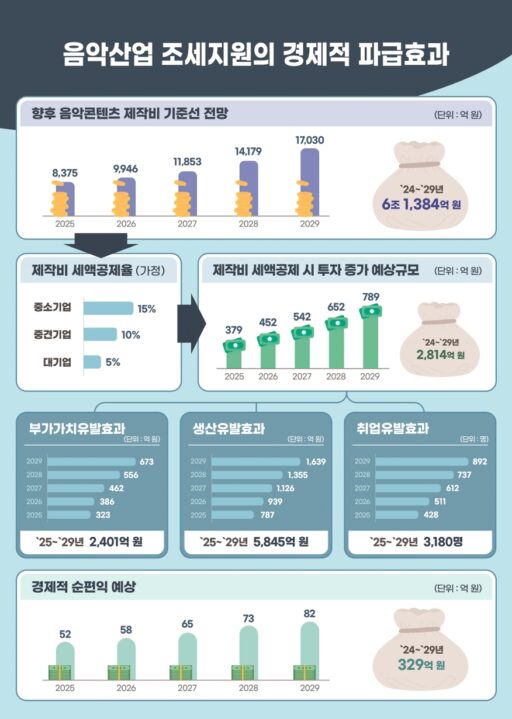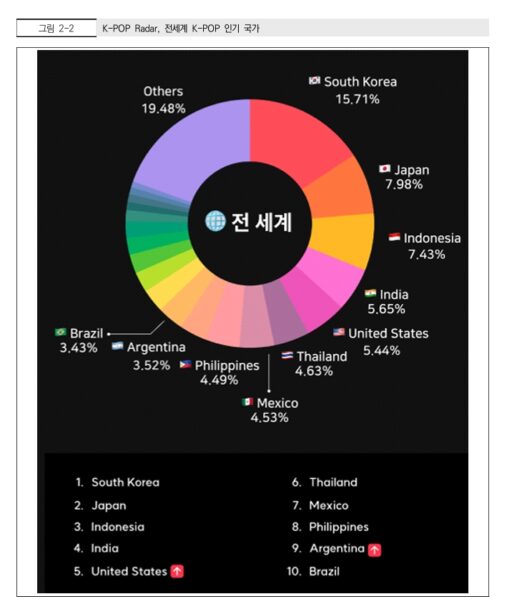
"Tax benefits: Why does Squid Game get them, but BTS does not?" (5 music organizations)
On the 11th, five music organizations in South Korea issued a joint statement. They expressed strong support for the cultural policy direction of the Lee Jae-myung administration and requested practical support for small and medium-sized record companies.
Currently, certain content sectors, including video and webtoons, receive production tax benefits. However, the music industry is not included in the support framework. According to IFPI's 'Global Music Report 2024', as of 2023, South Korea's music industry ranks 7th in the world.
The organizations pointed out the inequity. "BTS's 'Dynamite' music video achieved global success. Yet, it is not eligible for tax benefits," they stated, adding that "the music industry should also be included in a balanced national content support policy."
They proposed the establishment of a fund to alleviate the financial limitations faced by small and medium-sized record companies. Currently, policy finance support, such as the fund of funds, is mainly focused on video and webtoons, with no dedicated account for the music industry.
The organizations noted, "If a dedicated fund is created, small and medium-sized record companies will be able to produce creative and competitive content more stably."
Lastly, the five music organizations affirmed, "K-Pop is a future industry for South Korea and a strategic asset that drives diplomacy and the economy," and urged for tax support and financial guarantees for record companies.
The music organizations participating in this statement include the Korean Management Association, the Korean Entertainment Producers Association, the Korean Music Label Industry Association, the Korean Music Industry Association, and the Korean Music Content Association.


<Full text of the statement>
The five music organizations — the Korean Management Association, the Korean Entertainment Producers Association, the Korean Music Label Industry Association, the Korean Music Industry Association, and the Korean Music Content Association — warmly welcome the Lee Jae-myung administration's leap towards becoming a cultural powerhouse and its K-initiative policy. They emphasize the urgent need for substantial institutional support such as tax benefits and fund creation for record companies to ensure the sustainable growth of the K-Pop industry and ask for active interest and response from the National Assembly and the government.
Cultural powerhouse leap and K-initiative policy welcomed by the music industry
The K-Pop industry actively welcomes and supports the policy direction of the Lee Jae-myung administration, which has made the leap to becoming a cultural powerhouse and the K-initiative its core national agenda.
The K-Pop industry, which has played a central role in the global expansion of K-Culture, will continue to be a key driving force in enhancing South Korea's national competitiveness and realizing cultural sovereignty.
Recently, Netflix's globally popular content "K-POP Demon Hunters" has reaffirmed the practical potential and strategic value of leveraging K-Pop for national competitiveness. This shows that K-Pop is the most natural and effective means of introducing South Korea to the world.
– The global success of K-Pop is the result of the willingness of record producers to take risks in investment and planning, yet there is a lack of substantial institutional support for record companies.
– Record companies face double jeopardy from high risks and various regulations.
The global success of K-Pop is not a mere coincidence but rather the result of many record companies' bold investments, creative planning capabilities, and sustained risk-taking. However, until now, the majority of government policies related to popular music have been primarily focused on individual creators, with virtually no institutional support for record companies that actively compete in the fierce global market.
Moreover, the perception that some incidents are generalizable has ingrained the idea that record companies hold a superior position compared to artists and creators, preventing them from receiving appropriate recognition as stakeholders in the industry.
Recently, record companies have suffered from unilateral contract terminations and arbitrary activities by some artists who have achieved global hits, leading to lawsuits. The chances of record companies succeeding in the industry are slim, and even if they do succeed, they must constantly bear the risks, as the institutional frameworks are insufficient. In particular, small and medium-sized record companies are experiencing the double trouble of not receiving proper substantive support despite facing numerous regulatory hurdles.
Now is the time for the National Assembly and the government to reshape their view of record companies, recognizing K-Pop as a global industry and pursuing policy support that aligns with that recognition.
Systematic support for small and medium-sized record companies will establish a mutually beneficial structure for the entire industry, including artists and creators. To this end, we propose the following suggestions for the promotion of the K-Pop industry:
Suggestion 1: Introduce a tax support system for the music industry excluded from tax benefits
First and foremost, the tax support system for the music industry must be established, considering policy equity and its contribution to national development.
With the tremendous success of "Squid Game" overseas, interest in supporting K-content investments has risen. As a result, from 2023, the film content sector can benefit from a tax deduction of up to 30% on production costs.
In contrast, despite BTS's "Dynamite" music video achieving worldwide popularity comparable to "Squid Game," it is not eligible for tax support. This contradiction undermines equity among content sectors and could lead to long-term stagnation in the industry.
Due to the nature of the thriving K-Pop industry, the production costs of small record companies are similar to those of large companies, requiring massive investments of tens of billions of won just to debut a new idol group. Despite absorbing the high investment risks, the corresponding policy protections remain insufficient.
Recently, the Ministry of Strategy and Finance's tax support for the content sector has been limited to specific genres such as video or webtoons. However, a study by the Korea Creative Content Agency earlier this year confirmed that tax support for music content production can alleviate the financial burden of micro and small record companies and contribute to a virtuous cycle that leads to new content reinvestment.
We sincerely hope that the music industry will also be included in a balanced national content support policy.
Suggestion 2: Create a fund for small record companies
Small record companies possess sufficient creativity and planning capabilities but are constrained by financial limitations when it comes to making bold investments in content production. Therefore, the government must actively consider establishing a dedicated fund for small record companies.
In reality, the Ministry of Culture, Sports and Tourism and the Korea Creative Content Agency are currently implementing various support projects linked to policy finance and the fund of funds, primarily focused on the video and webtoon sectors, but access to support for the music industry is very limited.
For example, the K-content fund created by the Ministry of Culture, Sports and Tourism in February this year did not have a separate account for music, resulting in insufficient practical support. It is necessary to create a dedicated account for small record companies to ensure stable investment foundations.
If such an institutional framework is established, small record companies can procure funds more reliably and create more creative and competitive content, ultimately securing the diversity and sustainability of the K-Pop industry.
K-Pop is not just a popular culture genre; it is an industry of the future for South Korea and a strategic asset driving diplomacy and the economy. It is now time for the music industry to be placed at the center of national content industry cultivation policies.
The establishment of tax support and financial guarantee systems for record companies is a critically important policy that contributes to the sustainable growth of the industrial ecosystem and the globalization of K-Culture. We, the five music organizations, earnestly request positive policy review and implementation from the National Assembly and the government.
<Photo provided by the five organizations>


